When you have something in possession it is necessary for you to keep it maintained. Whether we talk about an enormous home or a pocket-sized book it needs maintenance. When we come to an unmaintained car it does bring certain risks as well which can cause problems over time.
To mitigate probable risks we have to keep our vehicle in good condition. Routine maintenance and inspection also save huge costs, give smooth drive, and keep up your car looks. Vehicles have become a dire need of time. In a single home, one will find a couple of vehicles that are used both as residential or commercial purposes.
Keeping your car maintained is not an uphill task; you can even do it yourself. This Blog will give you clear insight and tips on how to maintain a car and will also show you the core benefits and importance of car maintenance.
Tips for car maintenance
While going through this blog do consider the fact that even a trivial bird pooping can affect your car, now think about outcomes of accumulation of dust and rust on different internal components of your car. Won’t it be dangerous?
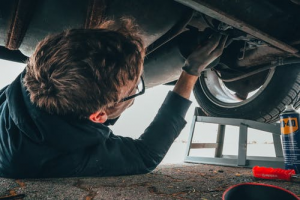
Check & Change Engine Oil
The engine is a basic automotive part or says a car-heart comprises many other metallic components. These metal parts move together, create friction, and generate heat. This friction and heat generation halt car smoother performance. To make the engine work efficiently and effectively, all the components need to be lubricated with engine oil.
Now, one may ask how to check and change engine oil, it is quite simple to do. For checking the engine oil, a clean dipstick is required which identifies the oil level and its color too. If the oil color is dark it means it is contaminated due to heat. Now you need to change it.
Make sure your car is standing on an even or flat surface. Drain the old engine oil and fill up new as much as described in the car owner’s manual. After changing the engine oil start your car for a few minutes to keep oil circulating throughout the engine.
Maintain Radiator Coolant Level
As the engine needs care, so does the radiator. Radiator plays a front line role, it keeps generally all the components cool and specifically engine.
Because the constant running of an engine makes it extremely hot so the radiator absorbs heat from the coolant and makes the engine cool. It is mandatory to check the coolant level before initiating a drive.
Radiator coolant also prevents freezing rust and engine blockade. If there is a low amount of coolant in the reservoir then there will be a risk of the car overheating because hot air will not evaporate.
It is recommended to frequently check and fill coolant as per the direction given in the owner’s manual.
Wheel Balancing, Rotation, and Alignment
I don’t know why people neglect this aspect of car maintenance although it is important in a multi-faceted way. Wheel balancing, rotation, and alignment serve proper handling of a car while driving and save fuel. You have to replace the position of car tires and shift 4 car tires accordingly.
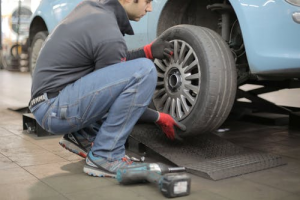
Following are the few importance of tires rotation:
- Equalization of Burden: A driver has to switch the position of car tires because apparently the front car tires endure more burden than back tires so an equal rotation will provide equal life to all the four tires.
- Balanced Handling: If tires are not frequently and evenly rotated, you will not attain balanced handling. Sometimes you will experience vibration and harsh noise. A car might also get uncontrolled in wet conditions.
- Tire lifespan: An equalization in tire rotation keeps tires last longer and does not let tires spoil early. It does save your cost of changing tires more often.
Brake inspection
Although the braking system is not so prominent it deals in a life and death situation. It needs to be “sensed” and looked after on a routine basis. I used the word “sensed” here because you can only feel an improper braking system if you are alert enough while driving. The indications which tell about the spoiling of brakes are harsh vibration, unusual pulling, shrill noise, and paddles becoming soft and even too hard to be pushed.
Brakes need regular maintenance to ward off inconvenience and danger. You should remove all the wheels and inspect the system to make decisions about replacing damaged brake pads, drums, rotors, or pistons.
Brake fluid needs also to be changed frequently to make the braking system run smoothly. When it gets dark in color the fluid must be changed and wheel components must be dusted off. The fluid lubricates the brakes and prevents it from getting corroded.
Check Tire Pressure
For regular car maintenance, it is important to check tire pressure because it affects handling and comfort. Car experts recommend that you need to check tire pressure at every fuel fill-up due to constantly changing tire pressure. You need to go through the car owner’s manual to find the actually recommended tire pressure.
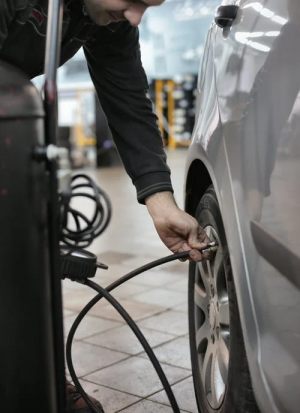
There are also smart devices available that monitor pressure and send notifications on your mobile phone. This is also a smart way to measure pressure and take action accordingly.
Change Automatic Gears & Power Steering Fluid
You must have experienced difficulty in manoeuvering a car and gears-sticking while driving. This happens when one leaves and does not heed to maintenance. All new cars now come with a hydraulic system that needs only a touch of a finger to get veered off. But, the system needs to be lubricated with Automatic Transmission Fluid for a great performance of power steering and automatic gears.
You have to inspect and replace old fluid with new on a routine basis to power the car's foremost functions. While pouring fluid, you will need a fluid transfer pump or a siphon. You should follow the owner's manual for the amount of fluid you need to pour.
Check Car Battery
Although a car battery doesn’t require a day to day check it’s maintenance needs to be considered twice a year. Battery terminals get rusted which can spoil its functioning. A driver needs to inspect the battery terminals and water levels.
While checking and cleaning the battery one thing is important that you should disconnect the negative terminal in the first go and then the positive one. When you come to connect the battery so do repeat the cycle backward by fixing positive first and then negative one.
Clean Rust On Your Car
Rust or corrosion can degrade your car’s appearance. As cars have a metal body it allows rust to encroach on if the maintenance factor is omitted or underlooked. If you don’t focus on the car aesthetic it means you yourself down the car's value.
In the internal parts of a car, rust takes place and it becomes dangerous too which affects the car’s core parts. You need to properly inspect a car and apply anti-rust products to overcome immediately.
You should not overlook or delay even a bird pooping on a car’s body because as days pass it gets jam and becomes a basis for rust.
Wash Your Car
You also need to wash your car because it faces street dust which spoils its looks. Car washing is not a big deal. Instead of taking your car to any car washing specific, shop you can wash it by yourself. Drench a car completely and apply car shampoo then, scrape every part of your car with a sponge. All the tires, windows, doors, roofs, and rest of the body should be washed. Car washing gives a car a new and pleasant look every time.
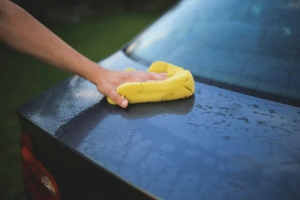
Car Maintenance Schedule
In doing car maintenance one may ask how often car maintenance should be done.
It depends.
There are multiple parts in a car that requires separate attention and time-period is also different for each function. It always depends on how many miles a car has been driven. Most of the car manufacturers use a 30-60-90 maintenance schedule. It means that specific things are required to be checked and changed at 30,000, 60,000, and 90,000 miles. So, I have described below the schedule of car maintenance in built-points.
- For engine oil and oil filter change, it is recommended to change it every 3,000 miles or three months. With today’s cars that run on synthetic, it is also safe to change it between 5,000 to 10,000 miles. But please keep a note or document the oil change so it will make you remember when to perform oil-changing next.
- Many car mechanics recommend replacing radiator coolant after every 30,000 miles. Some also suggest radiator coolant be filled after 60,000 miles.
- You should replace your car brake pad after every 20,000. A good brake pad/shoe can work more than 50,000 miles. For brake oil, it is recommended to replace it between 20,000 to 45,000 miles.
- As checking tires pressure just takes a couple of minutes, so it is suggested to check it every fuel fill-up.
- Automatic transmission fluid can last up to 100,000 miles whilst manual transmission needs to be changed in between 30,000 to 60,000 miles.
- It is recommended to drain and refill power steering fluid nearly 75,000 miles.
- You just need to check the terminals of the battery two times in a year and clean rust from it.
- For washing a car, it totally depends on how much you drive and where you drive. The car washing schedule is analyzed and affected by weather conditions, Nature of driving, location, and a driver’s preference or personality. Some suggest washing a car twice a week will suffice.
- The Spark plug should also be changed. A low-quality spark plug can work only around 30,000 miles but a good quality spark plug can last as long as 100,000 miles.
Importance And Benefits Of Car Maintenance
It is always important to maintain a car to keep it in good condition, for making it always look new, and to make it run forever. It also has too many benefits of keeping a car maintained. Its maintenance secures driver and passengers from roadside emergencies, prevents unwanted stops, conserves car repair cost, ensures safety, increases resale value, saves fuel, lengthens car lifespan, and boosts up car performance.
Here all the benefits and importance of car maintenance are explained.
Ensures Safety
Day after day we come to know about car accidents and other roadside emergencies which depress us and sadden our hearts. But these accidents occur just because of the irresponsibility of a driver or a car owner who doesn’t care about his car and pushes others' life in jeopardy.
Car regular maintenance which is vividly described above ensures safety from unwanted incidents and contributes to saving lives.
Ensures Environment Protection
When you don’t change your car engine oil it heats up, burns, and emits environmentally dangerous fumes which is not good for human beings as well. You should focus on taking proper and regular steps for car maintenance to secure the environment where you live.
Minimizes Repair Costs
A preventive step taken before is far more beneficial than taking it after the emergency has occurred. This phrase better fits on car maintenance because once you leave taking care of your car it creates a bulge of repairing expenses at the back-end. So timely maintenance does minimize your repair cost.
Boosts Up Performance
During a drive, a driver wants comfort and smoothness. A new car meets this need but as it becomes a little older it becomes our responsibility to keep it in a healthy condition. It is in our hands either to make a car look always new or make it dilapidated.
Regular and timely maintenance boost up car performance and make everyone feel as if it has just come out of a showroom.
Increases Resale Value
Just imagine yourself being in a car selling market and suppose as if you are buying a second-hand car. Now think which car would you select. Obviously, you will go for an aesthetically pleasing and better-performing car.
Now, as you have selected for yourself another person will also be meticulous about a car. A car remains in good condition just because of its proper maintenance which increases its resale value and comparatively looks better from other unmaintained cars of the same model.

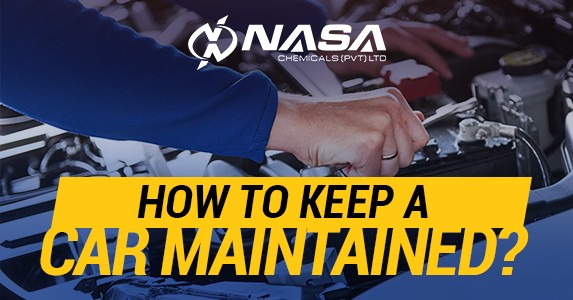
Comment (0)